The average American spends 10 hours per day in front of a screen. This amounts to over 3,800 hours per year, and ultimately means that an American can expect to die having spent a total of 34 years in front of a screen. We watch what we want, when we want, and we usually watch alone. A screen does not demand engagement or deliberation. It exists primarily to amuse us with easily-digestible sound bites and images. It either captures your attention or it doesn’t, which raises the uncomfortable question: Can a culture have any meaningful discussion, pursue truth, or elect a president when our standard of value is whether or not something can entertain us?
Our increasingly bizarre political landscape has led to frequent reference of George Orwell’s book Nineteen Eighty-Four, a dystopian novel about government suppression and public manipulation. But the late social critic Neil Postman would argue that it’s actually Aldous Huxley’s Brave New World – a novel about technological sedation – that we should concern ourselves with. Postman wrote:
What Orwell feared were those who would ban books. What Huxley feared was that there would be no reason to ban a book, for there would be no one who wanted to read one. Orwell feared those who would deprive us of information. Huxley feared those who would give us so much that we would be reduced to passivity and egoism. Orwell feared that the truth would be concealed from us. Huxley feared the truth would be drowned in a sea of irrelevance. Orwell feared we would become a captive culture. Huxley feared we would become a trivial culture.
This isn’t an enjoyable topic to discuss, but an important one nonetheless. Anyway, here are eight books that can help us understand the media-saturated chaos we’re living in.
Amusing Ourselves to Death: Public Discourse in the Age of Show Business by Neil Postman
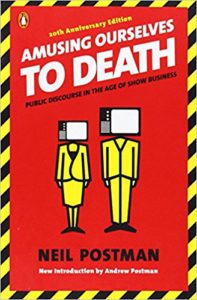 I was forced to read several excerpts from this book for a class a while back, but it wasn’t until I re-read the whole thing on my own time that I realized why this book is an Amazon bestseller even though Amazon didn’t even exist when it was published. Written in 1985, Neil Postman expresses his concern for a culture saturated with television. But the parallels between his predictions for television and today’s Internet culture are eerily similar. Postman noticed the seeds of a revolution taking place: that all experience, from politics to religion to news, was taking the form of entertainment and impairing our ability to think critically. He notes that we now expect everything we consume to be pre-packaged, simplified, and dramatized. This trend, according to Postman, leaves no room for rational discussion, debate, or complexity. The result? The only things that reach us are those deemed “amusing.” Never mind if they are helpful or true. This book is just as relevant now as it was over 30 years ago, and well worth the quick read (163 pages) if you want to take a step back from a tech-filled life.
I was forced to read several excerpts from this book for a class a while back, but it wasn’t until I re-read the whole thing on my own time that I realized why this book is an Amazon bestseller even though Amazon didn’t even exist when it was published. Written in 1985, Neil Postman expresses his concern for a culture saturated with television. But the parallels between his predictions for television and today’s Internet culture are eerily similar. Postman noticed the seeds of a revolution taking place: that all experience, from politics to religion to news, was taking the form of entertainment and impairing our ability to think critically. He notes that we now expect everything we consume to be pre-packaged, simplified, and dramatized. This trend, according to Postman, leaves no room for rational discussion, debate, or complexity. The result? The only things that reach us are those deemed “amusing.” Never mind if they are helpful or true. This book is just as relevant now as it was over 30 years ago, and well worth the quick read (163 pages) if you want to take a step back from a tech-filled life.
Alone Together: Why We Expect More from Technology and Less from Each Other by Sherry Turkle
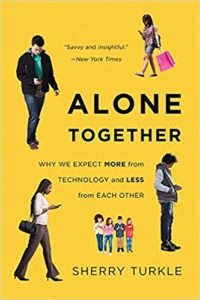 The argument that technology, particularly social media, has brought us closer together is a seductive one. But Turkle’s research here suggests that technology has isolated us more than anything. How often do we confuse Instagram likes with companionship or texting with intimate conversation? Based on 15 years of research and hundreds of interviews, Alone Together explores the human consequences of allowing technology into the aspects of our lives where it doesn’t belong, namely interpersonal relationships. “Relentless connection leads to a new solitude,” says Turkle. “We turn to new technology to fill the void, but as technology ramps up, our emotional lives ramp down.” The book is alarmingly critical, but ultimately encouraging as it asserts that we, as distinct human beings, deserve better than tweets, artificial intelligence, and text messages.
The argument that technology, particularly social media, has brought us closer together is a seductive one. But Turkle’s research here suggests that technology has isolated us more than anything. How often do we confuse Instagram likes with companionship or texting with intimate conversation? Based on 15 years of research and hundreds of interviews, Alone Together explores the human consequences of allowing technology into the aspects of our lives where it doesn’t belong, namely interpersonal relationships. “Relentless connection leads to a new solitude,” says Turkle. “We turn to new technology to fill the void, but as technology ramps up, our emotional lives ramp down.” The book is alarmingly critical, but ultimately encouraging as it asserts that we, as distinct human beings, deserve better than tweets, artificial intelligence, and text messages.
The Image: A Guide to Pseudo Events in America by Daniel Boorstin
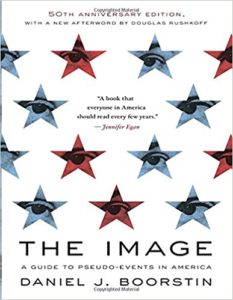 Arguably the most influential book on media culture ever written, Daniel Boorstin holds up a metaphorical mirror to American society and raises concerns regarding our ability to distinguish illusion from reality. Boorstin theorizes that pseudo events, the manufactured junk we watch on our screens 24/7 which exist solely for the purpose of being talked about, have seduced and corrupted us to the point that we no longer want to experience real life. When The Image was published in the 1960s, Boorstin was mostly concerned about TV pundits and manufactured gossip. And while these are still prevalent today, the basic theme of the pseudo event is in direct line with today’s social media and pop culture: we concern ourselves with appearance and non-reality so much that we foster unrealistic expectations for ourselves. Boorstin’s insights shine a bright light on the question of why we’re so dissatisfied with life. A thoughtful yet hard-hitting book, The Image should be read by anyone wishing to get back in touch with reality.
Arguably the most influential book on media culture ever written, Daniel Boorstin holds up a metaphorical mirror to American society and raises concerns regarding our ability to distinguish illusion from reality. Boorstin theorizes that pseudo events, the manufactured junk we watch on our screens 24/7 which exist solely for the purpose of being talked about, have seduced and corrupted us to the point that we no longer want to experience real life. When The Image was published in the 1960s, Boorstin was mostly concerned about TV pundits and manufactured gossip. And while these are still prevalent today, the basic theme of the pseudo event is in direct line with today’s social media and pop culture: we concern ourselves with appearance and non-reality so much that we foster unrealistic expectations for ourselves. Boorstin’s insights shine a bright light on the question of why we’re so dissatisfied with life. A thoughtful yet hard-hitting book, The Image should be read by anyone wishing to get back in touch with reality.
And Then There’s This: How Stories Live and Die in Viral Culture by Bill Wasik
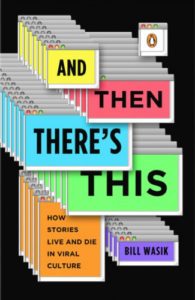 Every day a new trend or hashtag seems to beg for our attention online: a political scandal, a celebrity breakup, if you want a story you can find it. But how many of them actually last longer than a day or two? The problem is that there’s so many of these “nano-stories” that our brain’s attention span literally can’t process all of it. We become impotent when we try to have an in-depth conversation about a complex topic because we’ve been acclimated to the tweet, the soundbite, the Vine, the Snapchat, and other types of fragmented information. Bill Wasik offers a well-researched but humorous tour of our hollowed-out media environment, citing the dramatic rise and fall of pop bands and political blogs to illustrate how and why anybody with Internet access can snatch our attention and essentially create something out of nothing. Wasik isn’t calling for us to become completely tech-free or go back to snail mail. But by dissecting this new form of information dissemination, he is calling us to reflect on our habits and to seek more sustainable methods of information consumption.
Every day a new trend or hashtag seems to beg for our attention online: a political scandal, a celebrity breakup, if you want a story you can find it. But how many of them actually last longer than a day or two? The problem is that there’s so many of these “nano-stories” that our brain’s attention span literally can’t process all of it. We become impotent when we try to have an in-depth conversation about a complex topic because we’ve been acclimated to the tweet, the soundbite, the Vine, the Snapchat, and other types of fragmented information. Bill Wasik offers a well-researched but humorous tour of our hollowed-out media environment, citing the dramatic rise and fall of pop bands and political blogs to illustrate how and why anybody with Internet access can snatch our attention and essentially create something out of nothing. Wasik isn’t calling for us to become completely tech-free or go back to snail mail. But by dissecting this new form of information dissemination, he is calling us to reflect on our habits and to seek more sustainable methods of information consumption.
Life: The Movie: How Entertainment Conquered Reality by Neal Gabler
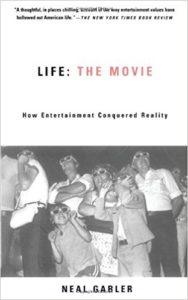 We have a tendency to consider entertainment as a separate entity from “serious” things, but Gabler observes that the ever-widening reach of TV and other media have turned such serious things like politics, literature, religion, and even our own lives, into one vast fantasyland. We can see the evidence for this claim everywhere we look; the determining factor for whether something is important is not its truthfulness, value, or quality, but its ability to entertain or amuse us. I guarantee this book will make you do a double-take and contemplate on what Gabler says is our “bottomless appetite for novelty, gossip, and melodrama.” Like many of the books on this list, Life: The Movie is prophetic in that Gabler’s observations have proved to be equally if not more relevant today as they were when he wrote the book in 2000.
We have a tendency to consider entertainment as a separate entity from “serious” things, but Gabler observes that the ever-widening reach of TV and other media have turned such serious things like politics, literature, religion, and even our own lives, into one vast fantasyland. We can see the evidence for this claim everywhere we look; the determining factor for whether something is important is not its truthfulness, value, or quality, but its ability to entertain or amuse us. I guarantee this book will make you do a double-take and contemplate on what Gabler says is our “bottomless appetite for novelty, gossip, and melodrama.” Like many of the books on this list, Life: The Movie is prophetic in that Gabler’s observations have proved to be equally if not more relevant today as they were when he wrote the book in 2000.
Within the Context of No Context by George W.S. Trow
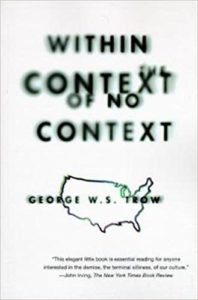 Originally published in a 1981 issue of The New Yorker, George W.S. Trow repurposed his classic work in 1997 with a new foreword in book form. Here, Trow offers a scathing critique of what he saw as the failings of an American culture that placed television as its center of attention. Trow’s work has been described as “half brilliant, half insane.” Nevertheless, I found his insights to be shockingly reflective of what happens when an entire generation grows up on game shows, trivia, and sitcoms, all of which provide no real basis or structure for learning – hence, no context. It’s sometimes difficult to read books that paint such a bleak picture, but I think it’s impossible to navigate our 21st century media nightmare without understanding how we got here in the first place.
Originally published in a 1981 issue of The New Yorker, George W.S. Trow repurposed his classic work in 1997 with a new foreword in book form. Here, Trow offers a scathing critique of what he saw as the failings of an American culture that placed television as its center of attention. Trow’s work has been described as “half brilliant, half insane.” Nevertheless, I found his insights to be shockingly reflective of what happens when an entire generation grows up on game shows, trivia, and sitcoms, all of which provide no real basis or structure for learning – hence, no context. It’s sometimes difficult to read books that paint such a bleak picture, but I think it’s impossible to navigate our 21st century media nightmare without understanding how we got here in the first place.
Technopoly: The Surrender of Culture to Technology by Neil Postman
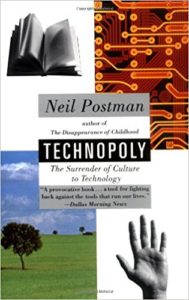 I was captured enough by Neil Postman’s Amusing Ourselves to Death that I picked up this book by him as well. Although everything he writes tends to have a sobering effect on the reader, it’s still somehow pleasurable to read. In this case it’s his call to reevaluate an American culture that fetishizes technology and values such technologies over our own human progress. “We tell ourselves that [technology] will lead to a better life…we proceed under the the assumption that information is our friend” writes Postman. “But it is only now beginning to be understood that cultures may also suffer grievously from information glut, information without meaning, information without control mechanisms.” Many of us, myself included, are blind to how our daily lives are colored by the technologies we passively allow into our lives. Postman possessed a rare ability to identify these trends before their effects set in. I don’t think his intention was to scare us away from TV (or the Internet today), but rather to make us aware of how we are shaped by such things and what we can do about that.
I was captured enough by Neil Postman’s Amusing Ourselves to Death that I picked up this book by him as well. Although everything he writes tends to have a sobering effect on the reader, it’s still somehow pleasurable to read. In this case it’s his call to reevaluate an American culture that fetishizes technology and values such technologies over our own human progress. “We tell ourselves that [technology] will lead to a better life…we proceed under the the assumption that information is our friend” writes Postman. “But it is only now beginning to be understood that cultures may also suffer grievously from information glut, information without meaning, information without control mechanisms.” Many of us, myself included, are blind to how our daily lives are colored by the technologies we passively allow into our lives. Postman possessed a rare ability to identify these trends before their effects set in. I don’t think his intention was to scare us away from TV (or the Internet today), but rather to make us aware of how we are shaped by such things and what we can do about that.
Empire of Illusion: The End of Literacy and the Triumph of Spectacle by Chris Hedges
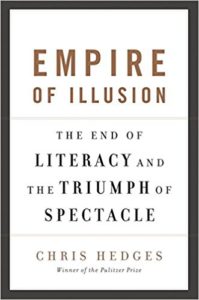 An unapologetic cultural critic, Hedges fearlessly exposes the dark consequences of allowing fantasy to overshadow reality in America. He argues that the celebrity gossip, trash-talk news, and mindless trivia that fill our lives are the product of a culture that is a-literate; that is, we are able to read, but choose not to. “We have traded the printed word for the gleaming image,” Hedges writes. “The culture of illusion reduces us to the level and dependency of children. It impoverishes language.” Written in 2009, Hedges predictions, namely predicting the rise of a Trump-like figure, are shockingly accurate. Although graphic at times, it’s a book that should be read often to bring us back down to Earth.
An unapologetic cultural critic, Hedges fearlessly exposes the dark consequences of allowing fantasy to overshadow reality in America. He argues that the celebrity gossip, trash-talk news, and mindless trivia that fill our lives are the product of a culture that is a-literate; that is, we are able to read, but choose not to. “We have traded the printed word for the gleaming image,” Hedges writes. “The culture of illusion reduces us to the level and dependency of children. It impoverishes language.” Written in 2009, Hedges predictions, namely predicting the rise of a Trump-like figure, are shockingly accurate. Although graphic at times, it’s a book that should be read often to bring us back down to Earth.
Dominic Vaiana studies writing and media strategy at Xavier University. You can get the PDF “11 Immutable Writing Lessons from Legendary Authors” along with his personal articles, essays, interviews, and book recommendations by joining his monthly newsletter.
dont swear